|
ONCE upon a time
there were four little children, three boys and a girl, who lived
near a beautiful forest. The eldest was called Dreamyeyes; the
second (the little girl) was called Brightface; the third was called
Saucymouth; and the little one of all Softcheek.
One fine spring day their mother sent them all out for a walk
in the forest; and told Dreamyeyes, as he was the biggest, that he
must take great care of the others. Away they all ran, as
merrily as possible, in great haste to get to the wood; yet for all
their hurry they stopped every minute to wish good morning to the
flowers that grew on each side of their way.
Before they could get to the wood they had to climb up a high
hill. It was a famous hill, with a number of fir-trees on the
top. In the autumn time they used to go and pick up the
fir-cones that lay strown all under the trees, and pelt each other
with them in play, for they were not hard or heavy enough to hurt;
and when they were tired of pelting each other, or when the little
ones were tired, then they all picked up the cones and carried them
home, to light their mother's fire. But now it was spring, and
there were no fir-cones. But for all that they went almost
every morning up to the top of the hill. And the top was sand,
into which their feet used to sink; and little Softcheek could
hardly get on at all, he sank so deep, so the others had to help
him up. And it was prime fun to run down again as fast as they
could through the soft sand; and if they fell ever so often they
could not hurt themselves.
This morning, when they got to the top, there was a lark high
high up in the sky, a long way above the highest of the trees; and
he was singing all the merry things in the world. And his song
came down through the fir boughs, as sweetly as the song of the rain
when the clouds touch the tree-tops. The lark flew higher and
higher, till he seemed like a speck in the clear blue sky; and then
higher still, until he was quite out of sight and they could only
just hear his merry voice; and then away ran the four children down
through the sand, on their way to the wood which grew in the valley
below and up the side of a hill directly before them.
It was a most magnificent forest, with clumps of oaks with
their old twisted branches, and long avenues of smooth-skinned
beeches with their graceful boughs drooping to the ground, and
birches with their flickering foliage and white stems like silver in
the sunlight; and there were many other trees besides. And the
great boughs arched over like the roof of some grand cathedral; and
the wind made music there; and the light played in and out among the
leaves, leaping through the green windows, chasing the wind.
When the wind blew through the leaves, in came the light; and the
wind shouted out, and the light laughed; and then the birds sang as
if they were playmates too; and the children laughed, enjoying the
forest pleasures.
And the forest was so full of all sweet sounds, the glad
voices of happy creatures! Sometimes a wood-pigeon would
whisper coaxingly from the thickest part of the beech-trees,
inviting them to come into the forest depths; and then a great
blackbird would bounce past them, singing and shouting out loud,
"I'll be there first"; and the bees sang too; and the ants went
bustling about their great loose ant-hills, and they sang, too, a
low sweet song at their work; and the green grasshoppers jumped and
sang, and sang and jumped, as if they were not quite sure how high
they could jump, or how high they could sing either; and sometimes
the frogs would pop their heads out of the water, or get out of the
pools and sit on the bank, and sing too,and very well they could
sing when they pleased; and though the butterflies did not sing they
were none the less loved by the children, for they seemed to be like
children, so happy and so loving, though they said nothing about it;
and there were the moths, quieter than any, in the dim evenings
they glided out of the shadows of the bushes, and looked so
beautiful they had no need to sing; and in this wonderful forest,
too, or rather round the margin of it, under the hedge-rows and
bushes, were the glow-worms who lit their bright green lamps for the
fairies to dance by, when the moon was busy lighting other forests.
And in this wonderful forest, too, were such multitudes of
flowers: primroses under the trees, and violets with them, in all
sorts of out-of-the-way corners; and wind-flowers living in crowds,
like flocks of little sheep, their delicate blossoms waving with the
least breath of wind; and then the forest would be full of yellow
celandine, lying like gold coin in such great heaps; and then the
hyacinths would ring their peals of blue bells under every tree, for
joy that the may was beginning to blossom; and the water-ranunculuses
lifted their white cups out of the water; and the honeysuckle and
the bryony climbed up over the shoulders of the great brambles, and
the white wild rose scrambled up after them, and the red campion
tried to lift its head as high as theirs; and then the ferns would
come, and grow up from little tiny stalks with tops like shepherds'
crooks, till their great fan-like leaves were big enough to hide the
rabbits. For there were a great many rabbits, too, in this
wonderful forest; and sometimes the children would nearly catch some
little one that had strayed too far from its hole, and then away
would scamper the little rabbit and the children after it, and
sometimes they were just in time to see its little white tail as it
seemed to tumble into its burrow.
There was one large mound, where a great many rabbits lived,
close to some of the largest oaks in the forest. There were
holes all round the mound; which the rabbits had dug, deep down in
the earth, under the roots of the oak-trees. The children used
very often to go there, and sit quietly under the oak boughs,
waiting for the rabbits to come out.
They waited a long while this morning, watching two birds
that were feeding their young ones in their nest on one of the
branches of the biggest oak. When they were tired of watching
the birds, they began to make chains of daisies, for there were
always daisies; and when they were tired of that the three eldest
children showered blackthorn blossoms over the head of little
Softcheek. There were heaps of blackthorn blossoms, that have
very little scent, and that come out into flower before the leaves
come; but they could find only one branch of the may, the
sweet-scented white-thorn, that blossoms after the leaves are out.
Brightface was the first to see it; and up they jumped and ran to
the bush, and Dreamyeyes reached up and pulled down the branch, that
Softcheek might smell how fragrant it was. There were only two
or three flowers full blown, but a great many buds, with little pink
lips, as if they wanted to be kissed. And Softcheek did kiss
them; and Saucymouth laughed; and then Dreamyeyes called gently,
"Hush! hush!" and they all listened, and heard the Cuckoo. And
Dreamyeyes said, "I was sure I heard him"; and the bird sang again,
"Cuckoo, Cuckoo!" and the children all cried "Cuckoo" too; and then
the other birds began singing; and the children began to sing one of
papa's songs.
And while they were singing under the may-bush, they saw,
peeping from behind the golden oak-buds in the great oak under which
they had been sitting, such a, beautiful face, that, instead of
being frightened, or even startled at it, though they had never seen
it before, they felt quite glad, and their eyes brightened, as if
they had seen some one they were very fond of. And little
Softcheek clapped his hands; and Saucymouth called to the lady with
the beautiful face, "Come down to us!" And the lady, who was
one of the forest fairies, slid down out of the golden branches, and
stood by them, and kissed them all, and stroked the head of
Dreamyeyes, and patted the plump cheeks of Brightface, and looked so
lovingly on Softcheek, and told Saucymouth to guess what she had
brought them. And Saucymouth looked up and laughed; and they
all guessed; and Brightface said "A fountain"; and the fairy
laughed, and said, "No"; and Dreamyeyes said, "Some flowers"; and
the fairy said, "What flowers?" And while Dreamyeyes was
thinking, Saucymouth stole behind the fairy, and peeped round again,
and whispered, "Heart's-ease."
It was the finest bunch of heart's-ease they had ever seen,
a bunch with three flowers and a little bud. And the fairy
told them it must never be divided, and by and by the little bud
would grow as fine a flower as the others; and it was not to belong
to any one of them, but to all of them together, and then it would
never die. And then Brightface turned to Dreamyeyes and said:
"We'll take it home, and put it in the lovely shell on the
mantelpiece, where the flowers die now; and then we shall always
have some in the shell." And then they looked round to thank
the kind fairy for her present; but she was gone, and they could not
see here anywhere. And Saucymouth called out, "Come back!" and
they all called, "Come back!" but it was of no use. And so
they said they would go home directly, and tell mamma what they had
seen and all the fairy had said to them, and ask papa to put the
flower in the shell. And Dreamyeyes told Brightface she should carry
it: "Because," he said, "I must help little Softcheek over the hill
again and all through the sand; and you know, Saucymouth, you must
help me to lift him over the big stones. So Brightface had
better carry it." And then they all said they wished the lady would
come again to them, for she smiled so kindly, and her voice was so
sweet and gentle; and they kept looking for her among the trees as
they walked on.
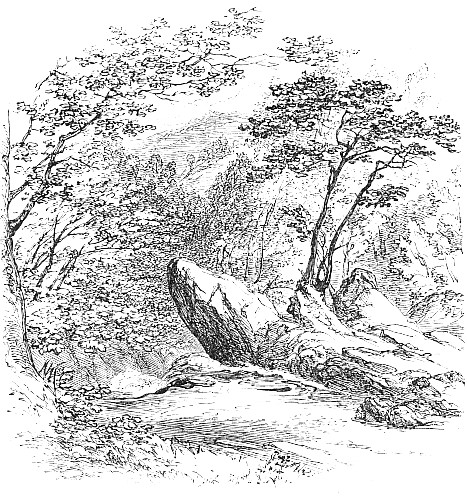
And all at once they heard a rustling in the branches, and
Saucymouth cried out, "There is the lady!" and a pretty wood-pigeon
flew out of the branches of an oak; and Dreamyeyes said, "Why,
Saucymouth, it isn't the fairy, but a wood-pigeon!" And the
pigeon flew over their heads, and right up to the top of the hill
where the great waterfall came from. And then they all ran
after it, and through the trees, and scrambled up among the bushes,
past the delicate young leaves of the honeysuckle, and Dreamyeyes
carried Softcheek pickaback, that they might get on faster, till
they reached the top of the hill. And while they were resting
there, Brightface dropped the flower into the tiny stream that made
the waterfall; and the stream whirled the flower round and round
till it was quite giddy, and then ran away with it, O, so fast, over
a lot of little stones, till it came to the edge of the rock, and
there it tumbled over, flower and all. And when Saucymouth saw
that, he threw himself down on the ground, and cried, and began to
kick, and then Softcheek cried too, till Brightface said, "it would
be very silly to make a noise, Saucymouth, for that could not bring
the flower back"; and Dreamyeyes said, "Perhaps we shall find it at
the bottom of the waterfall, or perhaps, we shall see the fairy
again, and then we will ask her to get it for us." "And if she
can't it will be of no use to cry," said Brightface. So then
Saucymouth got up, and he and Softcheek left off crying, and they
all set off to try and find the heart's-ease.
They had some trouble at first to get down by the side of the
waterfall, though it was easy enough for the stream that leaped
plump off the edge of the rock, shouting and laughing out loud, as
if it had had a good joke. And it did not leave off laughing
even when it got to the bottom, but jumped on, from one lump of rock
to another, laughing all the while so boisterously, as if it never
had had such fun before in all its life. And even at the
bottom of the fall it was very hard work to follow the merry stream,
for the rocks were very large and rough, and so awkwardly shaped;
and little Softcheek had to be lifted up, and then let down on the
other side of every great piece; and even Saucymouth, and once
Brightface, had to be helped by Dreamyeyes. But they went on
as fast as they could, looking very carefully, at every turn, into
the stream, to see if they could find the lost heart's-ease.
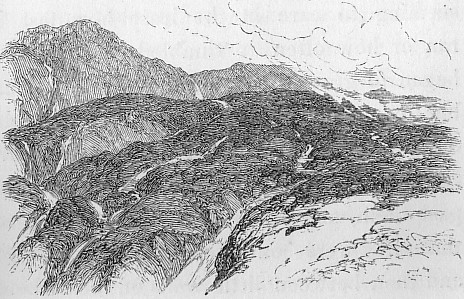
Then they came to a part of the hillside where there were several
little streams racing each other through the heath, till the
children did not know which was the one into which they had dropped
the flower. So they ran along as fast as the streams to the
bottom of the hill, where they found again the main stream into
which all the little ones were hurrying. But they could see no
heart's-ease. And now again there were great heaps of rocks,
some rough and some with sharp edges; and while the stream jumped
from one to another, laughing and singing, and not seeming to care
in the least how fast it ran or how often it tumbled, the children
began to grow tired; for they had to clamber over some of the rocks,
and to slide down others; and then to walk along narrow ledges, with
the water running wildly past them, and almost pushing them off, so
that they were continually afraid of falling; and then between
little walls of rock where there was hardly room to move; and over
flat, broad tables that looked very easy, but where they could
scarcely stand, because the green moss and weed that seemed like
soft grass was as slippery as ice. Even Brightface was almost
crying; but the stream went on gurgling and laughing as if it were
sobbing in fun, and after all, though it pretended to mock them, its
voice was so pleasant that they could not be angry with it, and
sometimes it slid very gently over a broad piece of slate, and
sometimes ran round a great rock quite out of its way, and then up
into a far corner, and leisurely back again, just as though it was
playing with them, and all the while sang so deliciously that
Dreamyeyes could not help singing too; and then Brightface laughed
out gladly again, and Saucymouth stepped out bravely, and they
carried little Softcheek among them over the rough rocks, and over
the slippery rocks, till at last they jumped down on the smooth
grass, and there they all ran on merrily enough, even faster than
the stream.
But now there were all sorts of things that hindered them
from making haste to overtake the heart's-ease. There were
some steppingstones across the water, and they could not help
stepping over them, though they had no occasion to do so; and
stopping to look up the stream, and then down the stream into the
larch wood, where all sight of it was lost. And then they were
obliged to track it by its song or by trees that grew on each side
of the gorge it ran through. And then, when the trees were
fewer on one side, and the little travellers could walk along the
meadows, there were so many things to admire. There were the
butterflies fluttering lightly by, as if they wanted to tempt the
children to play with them; and there were the beetles with their
shiny green backs and long, slender horns; and perhaps a bird would
fly out of the grass almost at their feet, perching on the ground
close by them, and then flying off again. Sometimes they
turned to look at the mountain where the stream was born; sometimes
they stopped to admire the feathery look of the firs, with their
filmy branches dropping like green icicles; and sometimes they went
down the bank to be nearer the sweet breath of the may-bush that was
dipping its long hair in the stream, while the little waves rippled
gently and kissingly over it, or else foamed up over some stone in
their way, till their spray was almost as white as the may-bloom.
Then they had to watch the honeysuckle just bursting into
leaf, and to think of the time when the fairies would gather the
honeysuckle's trumpet-like flowers, to blow a grand chorus for the
stars. And the wild rose, too, was about putting out little
shoots of new wood; and the folks'glove's young velvety leaves were
just beginning to peep out of the rank grass; and along with the
folks'glove were some great rocks putting their heads up as if they
wanted to ask the children about their old friends, the rocks upon
the mountains. They looked so strangely, those gray heads
pushing out among a lot of straggling, weedy hair in the middle of
the fields and some were in the middle of the water; and the waves
washed their old foreheads so clean; and all round one of them in a
corner the children found a great family of cuckoo-flowers with
their delicate pink blossoms growing out of the water, and they were
nodding their heads at the old rock and at the waves that ran by
them.
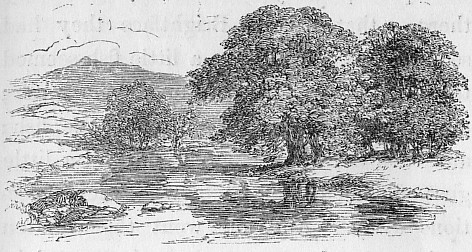
And as the children came farther on through the fields, they saw
some grand trees standing by the side of the river (for the stream
was now broad enough to be a river), and the trees leaned over it as
if they were looking at their own shadows in the water; and so, the
children stopped to look in the water; and the water was so clear
that it reflected all the blue sky and the clouds, and the children
saw their own images in it; and Dreamyeyes thought he saw the fairy
in the water; and they all leaned over to look, and there was a
beautiful face smiling up at them, through the long, smooth,
hair-like grass that was trailing along the current, as if the fairy
was floating in the river. But when they looked again they
only saw their own faces among the flags on the water; and they
thought that perhaps they had not seen the fairy there, that it
was Brightface they had seen instead. And then a little fish
seemed to fly through the clouds under the water; and the children
laughed to see the fish; and then the water laughed too, and a
little gust of wind came and blew all their reflections away.
And on went the children again. On they went through
the bright meadows, among the white daisies, and the purpled clover,
and the yellow dandelions and buttercups, and then again under long
avenues of such high trees, with the blue sky peeping through, among
the violets and the blue hyacinths and the yellow strawberry-blossom
and the little blue speedwell; and then out again from under the
trees, over yellow crow's-foot, and down to the river-side, where
the blue forget-me-not looked up at the sky through the golden
sunshine, and reminded them of their lost flower.
And the four children sat down for a while by the side of the
blue forget-me-not, in the sunshine, and asked each other where the
fairy's flower could be. Dreamyeyes said he was sure they
should see the lady again; and Brightface looked at him and grew
brighter; and Saucymouth said, "I will get the flower.
Come on!" But they would not go directly, because little
Softcheek was tired. So they rested there some time till he
asked to go on again; and then Saucymouth said, "Come on!" again,
and ran on before them through the grass. And now they saw
some cottages on each side of the river, and little gardens round
them, and clumps of elm-trees in between; and the river widened and
widened, and flowed more leisurely, as if it were a very little
tired with its long journey. And the children walked slowly by
the side of it, looking very steadfastly across it. But there
was no heart's-ease there. They looked round, and they saw the
blue smoke curling up to the sky from the cottage chimneys, and they
saw the men at work in the fields, and the waggons going along the
road, and the sheep lying on a hillside in the sunlight, and the
swallows skimming over the surface of the river; but they could see
no heart's-ease. And they heard the blacksmith at his forge,
and the carpenter hammering, and the dogs barking as they drove the
cows home, and the thumping of the flail on the threshing-floor, and
the church-bells ringing merrily; but they only thought now of the
lost heart's-ease.
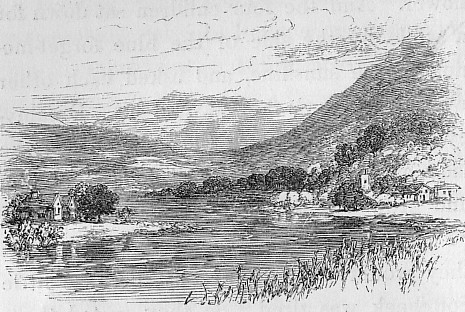
And the river widened and widened, and they grew puzzled, for they
did not know how far it might lead them; and at last they sat down
again on the grass, not knowing at all what to do. At last
Dreamyeyes looked up and said, "We will go to the top of the hill
beyond the village, and from there we shall be able to see where the
river goes to." They were soon there; and O, so glad they had
come, for they saw from the top of the hill the most splendid view
they had ever seen. There were broad masses of trees close
under where they sat, and the wide river flowing grandly below them,
and farther on more trees, great heaps with their rich spring
foliage, and the river beyond them, and then trees again; miles on
miles of the glorious river winding in and out among the trees until
it reached the sea. And just as they first caught sight of the
sea, one wide sun ray gleamed out from under a violet-coloured
cloud, and poured its light all along the river and over the trees,
so that they looked as if they were growing out of a gold mine, and
the river like melted gold running between them. And the
children sat like four golden statues on the top of the hill, with
eyes half dazzled, watching the wonderful scene.
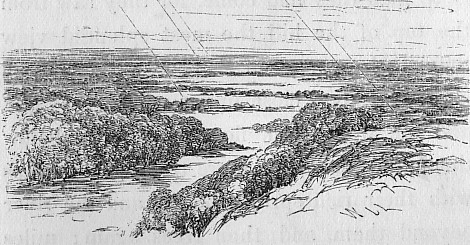
At last, Saucymouth said, "We will come back to-morrow, and go all
the way down to the sea, and get the heart's-ease." And
Dreamyeyes smiled, and said, "We should never find it by ourselves,
Saucymouth; I wish the lady would come again." Brightface
could only look at the bright river, and said nothing; and Softcheek
asked to go home.
There the four children sat, like gold statues in the
sunlight, till it was quite evening; and then the sky grew all
bright with the golden light, and they saw the great round sun drop
gently down, like a ball of fire, behind the sea. Just before
it was quite gone, Dreamyeyes said, gently, "Look!" They all
looked, and saw, between them and the sun, a long way off, as if it
were over the sea, a lady rising in the air. It was the fairy.
They were too much delighted for any of them, even for Saucymouth,
to speak to her. There they all sat on the golden hill, as
still as statues, looking at the lady fairy. She came nearer
to them, nearer and nearer, till she was near enough for them see
that she had the bunch of heart's-ease in her hair, over her
beautiful forehead; and then she floated away again like one of the
sunset clouds, and the sunlight just touched the flower on the top
of her beautiful forehead, and made it shine like a star; and they
saw her rise higher and higher towards the sky; and, as they looked,
the flower became brighter and brighter, till at last it changed to
a star; and then the lady faded away, and they saw only the bright
star shining on them from the delicate sky,shining if so tenderly
and lovingly, as it were smiling on them, as the beautiful lady
smiled when she first gave them the heart's-ease.
The sun went quite down; and Dreamy-eyes led his sister and
his little brothers down the hill, homeward, to their mother and
father. The twilight was very pleasant, and the Star of the
Flower went before them, lighting them all the way.
The night was coming on; the sleepy flowers were nodding
their heads; the primroses and daisies, and even the tallest
buttercups, closed their drowsy eyes; the birds went home to their
nests; the dragonflies rattled past on their way to the pool; the
children saw the grey moths gliding in and out of the bushes, and
the bats flittering over their heads. Now and then some little
bird chirruped as the sound of their footsteps woke him from some
sweet dream in the tree where he loved to roost, and then he turned
round, and was asleep again almost before they had passed.
Brightface was tired, but walked on very happily, looking sometimes
at the Star, and sometimes at her brothers. Saucymouth was
tired too, but sang a merry song, and so helped on both the others
and himself. Little Softcheek put his arms round the neck of
Dreamyeyes and laid his head upon his shoulder, and went fairly off
to sleep; but sometimes he woke up, and looked to see if the Star
was still there; and then Dreamyeyes smiled on him, and hugged him
more closely. And after a little while, when Saucymouth was
too tired to sing, the nightingales came out of the forest and sat
in the trees on their way, and sang to them so deliciously such
sweet songs, like those their father sang to them. And so they
went bravely on, till they came to the old door, where their mother
waited for them. And they all ran into her arms, and she
kissed their dim eyes, and their father sang to them as they fell
asleep.
And that night Dreamyeyes dreamed that the great
chestnut-tree was in full bloom, and that every bunch of fragrant
blossom stood up, like a rosy flame, pointing to the sky, as if the
chestnut-flowers, too, hoped to become stars.
DEAR CHILDREN!
Let the elders teach the young ones that, though the
Heart's-ease be lost, it may be found again. Seek it
cheerfully; never despair; and the Star of the Flower shall light
you even homeward.
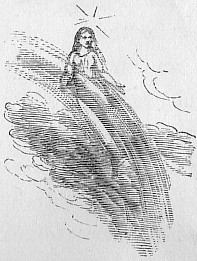
――――♦――――
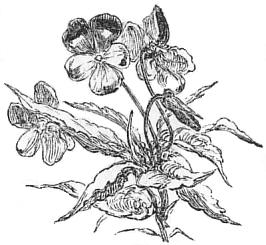
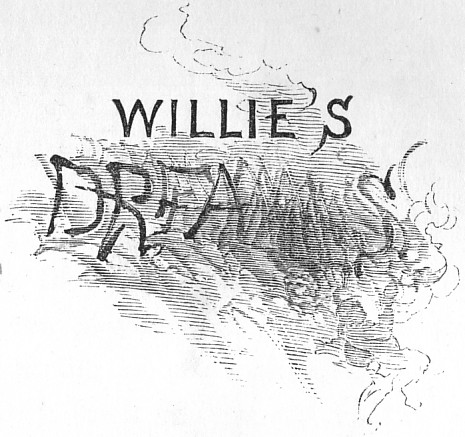
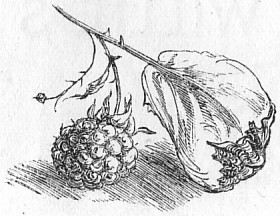
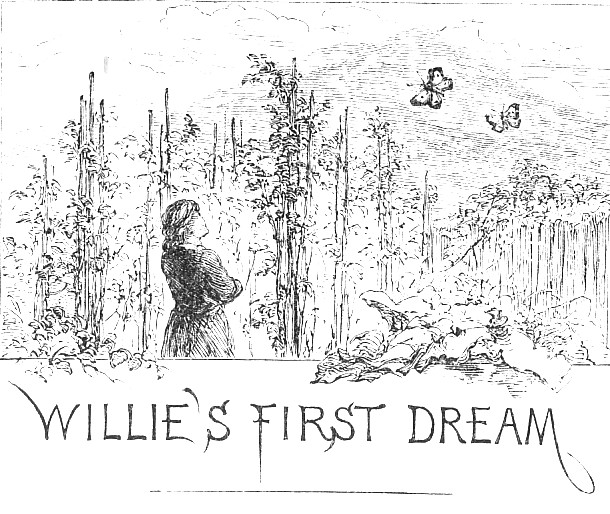
ALL the long
summer day Willie had been playing and working in the garden,
running about, looking at the butterflies with their differently
spotted wings, watching the bees as they plumped headforemost into
the companula bells and came back again loaded with honey, noticing
what new flowers were in bloom, how many more strawberries and
raspberries were ripe. Some of the ripest strawberries he had
gathered and taken on a broad vine-leaf to his grandmamma; he had
weeded the carrots too; and taken the beautiful black and yellow
caterpillars off the cabbages and carried them far away to the
common, where they could do no harm. He had seen one slender
blue dragon-fly, and found the first ripe cherry. And at last,
just as the great blue beetles began to fly about, stumbling against
everybody in their way, he went to bed quite tired, and fell asleep
in the very middle of one of papa's songs. When he was fast
asleep, the moon rose behind the hills; and, after looking for some
time at its reflection in the little stream at the bottom of the
orchard, the stream where the marsh marigolds grew, it glided
through a host of silvery clouds, and came very silently to peep in
at the window of the room where the little boy slept. And
Willie, as soon as the moonbeam lighted his face, making it as
bright as if mamma had kissed him, began to dream.
He dreamed that some one had kissed him in his sleep,
and that he looked up and saw the moon shining into the chamber, and
in the middle of the moonbeams was a very lovely face smiling on
him; and he thought the beautiful lips moved, and a very sweet and
gentle voice told him to get up and come out into the forest in the
moonlight. And then he dreamed that he got up, and made great
haste, and very quietly dressed himself for fear of waking his
little brother, who slept in the same room with him; and he thought
the lovely face lighted him down stairs, so that he easily found his
way out of the house into the garden. And in the garden it was
nearly as bright as day. All the difference was, that there
were very soft shadows under all the trees and shrubs and flowers,
and that the colours of the leaves and flowers were much more
delicate than in the sunshine. The flaming cheeks of the
nasturtiums were not near so red as he used to see them, but the
tints of the lilac were more beautiful than ever.
And Willie dreamed that he went through the garden, and
across the road, and over the common among the daisies (who were all
fast asleep with their leaves close shut up), till he came to the
forest. All was so still and quiet! He could hear
nothing except the low sweet breathing of the wind among the wild
roses and honeysuckles that hung over his path. Now and then
the wind blew down a tiny rose leaf; and all was so quiet, he could
almost hear it fall on the grass. He thought the roses and
honeysuckles had never been so fragrant.
On he went, through the bright moonlight, till he came to a
part of the forest where the foliage was very thick, so thick that
the moonbeams could hardly find their way between the leaves to the
little path on which Willie was walking. Still he went on very
happily, quite sure that the lovely, smiling face was taking care of
him; and the forest branches became closer and closer, and more
crowded with leaves, till it was so dim he could scarcely see where
the path was. And just as he came to the very darkest part of
the forest, all at once a nightingale sang to him from one of the
branches close by; and the moment the nightingale sang he saw a
little green light in the long grass beside him, and he looked down,
and found it was a glow-worm whom the nightingale had called to
light him on his way. While he was leaning down to thank the
glow-worm, a great many more nightingales began singing; so many
that all the dark part of the forest seemed to be as full of music
as the bright part was of moonlight; and when he lifted up his head
to go on, he saw, on each side of his path, rows of glow-worms,
waiting to light him with their green lamps.
And then Willie dreamed that he went on, thinking whether he
should see any of the fairies carrying dew to the flowers; and
sometimes he fancied they were close to him, when the dew-drop fell
off the honeysuckle leaves as he pulled down a branch to smell the
sweet blossoms.
So he went along through the forest till the light began to
come again; and then the nightingales left off singing, and the
glow-worms put out their lamps. And there was a great sound of
wings, as if all the nightingales had flown away together; and when
they were gone the forest was so still he could almost fancy he
heard the sound of his own footsteps on the white grass. And
the dim light grew, even though the moon was now gone behind the
farthest trees; and the trees stood out like great gray shadows in
the mist; and then the clouds above, where the forest was not so
thickly overarched, were tinged with a delicate rose-colour.
And presently it grew lighter than ever, and he heard a cock
crow, and almost directly after found that he was on the edge of the
forest, in a large field, and that it was nearly morning. He
could not imagine how he should have wandered so long and so far
into the forest; and then he thought he would turn and go home,
but when he looked back to the trees, they were all so dim and
dreamy he thought he should not find his way. So he went
across the field; and as he turned round the corner of the hedge he
saw a little round, smooth hill, and on the side of the hill, among
the yellow cowslips and grass, there were some people sitting.
And Willie dreamed that they all looked very handsome and
good-natured; and so he ran up the hill, and asked them what they
were doing there. And they told him they were waiting for him
to go with them to see the sun rise, and that they must make haste,
or they should be too late.
And then Willie dreamed that he went with all the people over
the hill, and down the other side to the edge of a great river; and
there, fastened to a willow that was hanging over the water, he saw
two little boats. And he and some of the people got into one
of the boats, and the rest of the people got into the other; and
they untied some brambles that had held the boats, and the boats
began to float very smoothly down the stream. And there was a
light mist hanging about the river, so that the great trees standing
on the banks and all up the hills on each side, though the moon was
gone, had still a very moonlighty look in the grey morning; for the
sun was not yet up. But there was one pale star in the east,
showing them which way the sun would come. And the river was
all full of white and yellow water-lilies, the largest flowers
Willie had ever seen; and their great broad flat leaves he thought
were nearly big enough for boats; and a little sky-blue dragon-fly
was asleep in one of the white lily-cups.
While the boats glided down the river, the people in them sat
just as they liked, and did nothing but sing; and Willie wondered
how it was they knew all papa's songs, for they sang them all to
him, and he sang with them.
After a very little while the two boats stopped against the
bank in a bend of the river, under a great tree; and all the people
got out, and began to climb a hill on the opposite side of the river
to that where Willie had first seen them. And then Willie
again heard a cock crow; and the people took hold of his hands, and
they all ran together to the top of the hill, just in time to see
the sun rise. And then the good people sat down on the top of
the hill and had some breakfast; and they gave Willie some bread and
honey, and some strawberries, and some milk for his breakfast; and
when they all had enough, they asked Willie if he would go any
farther with them.
And so Willie dreamed that they went on together through the
fields. And the fields were all full of very strange flowers,
with scarcely any colour in them; and there were long rows of trees
and hedges of a very pale green all round the fields; and they
walked through a great many fields, and over a great many very high
stiles; and the birds kept chattering; and the wind blew; and the
people talked very fast in a language that Willie did not
understand. But whenever he felt as if he were going to be
frightened, they smiled on him, and spoke so that he could
understand them, and then he was very glad to go on again with them.
At last they came to a village. They went through a
farm-yard, and so into the road, and up a rising ground to the
houses. It was a very beautiful village, very nice cottages
with roses, and jessamine, and clematis, and vines, and fig-trees,
growing all over them; and round each cottage a little garden full
of cabbages and peas and sweet-scented beans and all sorts of
flowers and fruit-trees, and a broad road between them, with, rows
of trees on each side; and the bees were singing in the gardens, and
such hosts of butterflies sporting everywhere! And it seemed
to be a grand holiday, for everybody was coming out of doors, and
they all wore their best clothes, and looked as bright as the
sunshine itself. And some of them had bows and arrows, and
some had long thin swords, and some had music, and they were all
very busy; and then Willie dreamed that he and the people who were
with him went and walked along with all these other people, singing
papa's songs, till they came, a very little way from the village, to
a large common. And then he and a great many more of them sat
down on some seats that had been made of turf, and the games began.
First, at one end of the common they set up a target, painted
all the colours of the rainbow, and white in the middle; and a great
many boys came with bows and arrows, and shot at the target, and
several went very near to the white, but only two or three of them
could touch it. And then Willie dreamed that he shot at the
target, and after trying a great many times he hit it in the very
middle of the white. And all the people clapped their hands,
and said he was a very good boy, all except one little old man
with a very dark face, and he came and said to him very kindly, "You
know, Willie, you are dreaming."
And then they all went and stood on the two sides of the
common, and left a clear place in the middle; and at one end they
hung up a crown of daisies and then all the boys set off running,
and Willie tried very hard to keep first; and for a little while he
got on very well; and then some one seemed to be pulling him back,
and everybody ran past him, and he could not get on at all.
And then he thought he left off being tired, and ran on so fast that
he passed every one, and got the daisy-crown, and then he saw that
the daisies were all shut up, and the little man said, "You are
dreaming, Willie."
And then he thought a great many of the boys stood up for a
wrestling-match, to try which were the strongest. And two very
beautiful boys, the one who had shot nearest to the middle of the
target, and the one who had run fastest next to Willie, stood by to
see that they played properly; and then they wrestled together, and
tried to throw each other down. And when all the bigger boys
had done, Willie went and wrestled too, and his foot slipped, and he
fell flat down on his back; and then, while he was getting up, the
little man came to help him, and smiled very kindly on him, and
said, "Never mind, Willie! you know it is only a dream."
And then some of them brought the long thin swords, and the
boy who had wrestled best sat down in a chair; and they gave Willie
some of the swords to hold; and two of the biggest boys began to
play with the swords; and when one touched the other with his sword,
the boy in the chair gave the winner a crown of heart's-ease to
wear. And then two other boys came and played with the swords;
and every time one touched another with his sword, and the boy in
the chair got up to give him his crown, the little old man came up
to Willie, and patted him on his head, and kissed him, and pointed
to the winner, and said, " It is nothing but a dream, you know,
Willie."
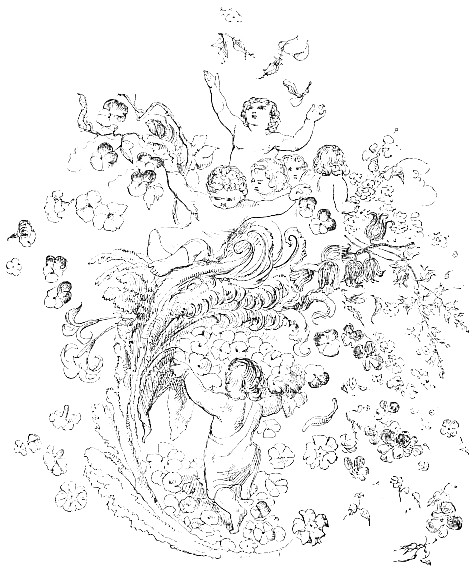
When they had done playing, a great many beautiful children came
running on to the common with their pinafores full of flowers; and
they began to pelt everybody with the flowers, and to throw them
about in all directions; and they never seemed to empty their
pinafores, but as fast as ever they threw the flowers out more
flowers came there, till the whole common was covered with them.
And the children ran before everybody, throwing the flowers all over
the road, and all the people set off to go home through the flowers
that covered their feet and reached nearly up to their knees.
And then some trees all at once grew up among the flowers; and the
trees were all covered with pink and white blossoms; and then a gust
of wind blew off all the blossoms, and the trees were all covered
with ripe fruit; and just as Willie and the people were going to
pick some of the fruit, another gust of wind blew it all off the
trees, and the plums and pears and apples and peaches and greengages
rolled all about the road, and the little children picked them all
up, and ran away laughing with them; and then a great many laughing
larks began to sing papa's songs in the branches; and then another
gust of wind blew all the leaves off the trees, and the birds flew
away, and it began to snow very fast. And the wind blew very
loudly, and the snow flew about in all directions, so that Willie
could not see his way; and then the good old man with the dark face
took him on his back, and carried him through the snow to a little
house thatched with grass; and just as they were going under the
door, Willie saw the sun rising behind the house; and when he was
about to ask the little old man why the sun was rising again, he
heard mamma say, "Why, Willie, boy! will you never get up this
morning?" And then he looked up and found that he was lying
snug in bed, and the sun was shining in at the window.
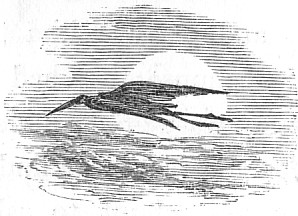
――――♦――――
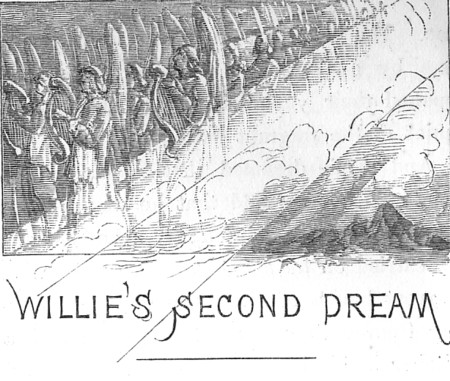
EVENING came
again, with the long shadows. The great troop of rooks flew
over the garden, on their way to the elms in the churchyard, the
last one was gone by; the great long-legged heron was just off for
his night's fishing; the little white moths glided out from under
the vine-leaves that grew round the window where mamma sat, singing
the baby to sleep. Willie came and kissed them both, and ran
back to his little bed, and was soon asleep too. The pale
stars came out very slowly, one by one; and the evening primroses
opened their yellowish flowers in the cool quiet of the fragrant
twilight.
And Willie dreamed that he had grown up to be a man, and that
he was walking in a very large garden; and he thought he carried on
his shoulder a long pole, with a great bunch of ripe purple grapes
hanging from each end of it. And he had a pitcher in his hand,
into which he wanted to squeeze the grapes, for he was very thirsty;
but yet for all he could do he could not help walking on
continually, so that he was never able to set down the pitcher to
squeeze the grapes into it. And then he dreamed that he was a
boy again, walking through some cornfields with a beautiful little
girl. And he thought he had given her one of the bunches of
grapes, and that he had lost the other; but he did not care anything
about it, or about the pitcher, for he had no time to do anything
except to look at the blue eyes of the little girl who walked beside
him, and at the blue cornflowers that grew in among the golden corn.
And he thought they walked for a long while through the field,
without ever seeing the end of it; and the little girl talked and
laughed with him; and sometimes she stopped to tell him to look at
the cloud-shadows which the warm wind every now and then blew across
the bright cornfield; and then he thought instead of the blue
corn-flowers there were a great many red poppies growing in the
corn, and presently there were more poppies than corn. And
then he thought they sat down on a bed of red poppies, and he
gathered an armful of their great flowers, and made two crowns of
them, for himself and the little blue-eyed girl; and then they fell
fast asleep, just as the ripe corn was getting almost as red as the
poppies, in the cloudy sunset.
And then he dreamed that a cold wind woke him, and he found
himself alone in a wide place, in the grey of the evening; and he
could see no houses anywhere, and only a few stunted trees.
And there were no stars, nor moon, nor sun, but a dim sort of
twilight that made the trees and the ground and the clouds all one
dull grey. And the clouds hung so low that sometimes he almost
walked through them. And he was standing by the side of a
broad stream that was flowing very slowly. And he thought he
wanted to go across the stream, and so he walked into the water, and
went in deeper and deeper, hardly able to stand against the current,
which, though slow, was very strong, till he was nearly in the
middle; and then the stream lifted him off his legs, and carried him
head foremost for miles and miles and miles, past very long rows of
willow-pollards, all of one height, that stood on each side of the
stream. And he thought he could not help counting the willows
as he floated along the water; but whenever he counted near to a
hundred, he forgot the number, and had to begin again.
And so he went on for a long while; and then the stream began
to run faster and faster, till he went so fast that he could not
count the willows; and then all at once he went down a waterfall,
where he kept falling and falling, till he thought he never should
get to the bottom. At last he did get there, and found himself
on a smooth floor, strewn all over with soft gold sand, in the midst
of a great many tall white coral pillars, that reached up to the
roof. And the roof was made of water-lily leaves, with blue
sky and sunshine peeping in between them.
And he walked on a great way under the water, looking at the
gold and silver fishes playing among the lilies over his head.
And then the sun set, and while it was setting it made all the coral
pillars red, and the gold-fishes looked like flashes of lightning,
as they leaped in and out among the lily-leaves and the purple
evening clouds. And then the stars came out, and turned all
the coral pillars white again; and the stars looked like white
lilies among the leaves. And then the full moon rose, and hung
for a moment over the lily-leaves, till they looked like green ice,
and their long stalks like icicles, and the green light slid all
down the sides of the white coral; then the moon seemed to melt a
great hole in the green ice, and all the water rushed in like a
waterspout. And Willie thought that the water knocked him
down, and he had to scramble up again, out of a heap of very
beautiful shells, of all sorts of strange, shapes, and of all the
most delicate colours possible; and some of the shells were playing
such delicious music!
And then he thought he rose up through the water, and the
fishes swam all about him; and after a little while his head reached
the top, and then a lady took hold of his hand, and helped him out
of the water. And as he stood on the bank, in the moonlight he
turned round to look at the lady, and she was floating over the
water, as if she were almost water herself; and everywhere, as she
moved, an arch like a rainbow moved with her. He called to
her, but she did not answer him, though she seemed to beckon him
again into the water; and before he could even think whether or not
he should try to reach her, she had faded into the moonlight, and he
was alone again. And when he looked round, he saw that he was
on a very little island, in the middle of the sea; and he walked
across the island, and found the opposite side was very rocky; and
the waves were singing up and clown the shingle as the tide came up,
and the creamy foam broke over the rocks a long way above his head.
But in one little bay the water was so clear that he could
see the green and the black and the red and white sea-weeds growing
like great forests, out of the rocks, far underneath; and their
branches waved when the water moved, just as the boughs of the tall
trees wave in the wind. And the rocks on shore were covered
with flowers, the yellow sea-poppy, and the blue holly, and the
purple onion blossom; and, farther up, the little yellow rose and
the purple heath, all growing in the sand on the rocks. And
then the sea came up higher and higher, and he had to mount the
cliffs till he came to some patches of folks'glove and wild
heart's-ease. And then he found a cavern, hollowed all under
the ground, and he went in; and the cavern went down very steeply,
and he wandered on a great way quite in the dark; and then it became
a little light (just light enough for him to make out very dimly the
forms of some trees and hills); and then several rays of light came
down through a great cloud, and there seemed to be steps in the
rays; and he climbed up them through the mist, for though the steps
themselves were only mist they did not give way under his feet, but
bore him up, with a pleasant springy feeling, like the softest
possible moss or close turf, till he got to the top of the cloud,
and there, a long way up in the clear blue sky, he saw a number
many more than he could count of angels, all clothed in white,
with silver harps in their hands. And he heard them singing;
and their song sounded like the song of the shells and of the sea
only far more delightful.
He thought he never could hear enough of that song. And
then he looked back to the clouds, and as the wind every now and
then blew them aside, he saw the grey mountain-tops peeping up
between them, and then patches of green with the sunshine on them;
and then he saw down into the valleys, and was able to make out
quite plainly the fields and woods, and rivers, and great lakes, all
lying like a silver map in the sunlight. And on one of the
highest of the mountains he saw a lady sitting among thorns and
brambles. There she sat till the sun went down; and then the
evening star poured one bright ray down on her head, and a great
rosy light like the aurora borealis came up out of the sea, so
bright that the lady was obliged to shade her eyes with her hand.
But still she sat there looking so patient and so serious, as if
watching for some one who would not come, till the light filled the
whole sky, growing brighter and brighter, so that Willie was half
blinded and bewildered with its brightness. And as the cloud
upon which he stood melted in the rosy splendour, he found himself
close before the beautiful lady on the mountain-top; and it seemed
to him that she had the blue eyes of the little girl who used to
walk with him in the cornfields, only she was so much older and
grander, and more womanly; and her voice was sweet and gentle as the
voice of the blue-eyed girl, as she asked him why he had left the
cornfields and the coral palaces to climb among the clouds to the
barren mountain-top. And as she spoke all the sadness went out
of her beautiful face, and she smiled on him, and put forth her hand
to take his, and leaned her beautiful face forward till her hair
hung over his forehead.
When Willie awoke his cheeks were wet with tears, and he was
sad, though he did not know why. He seemed still to hear the
wonderful harmonies of the silver harps and the voice of the
blue-eyed lady. Was it only that the moon was just stooping
down behind the forest, and that the birds were singing merrily in
the rosy dawn?
――――♦――――
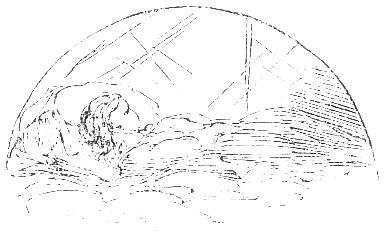
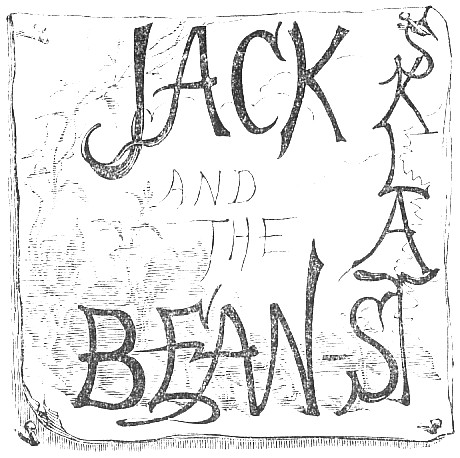
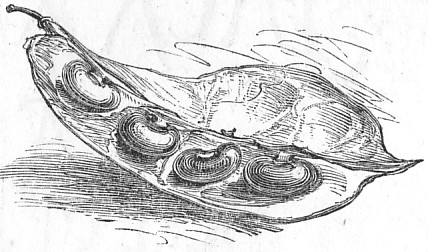
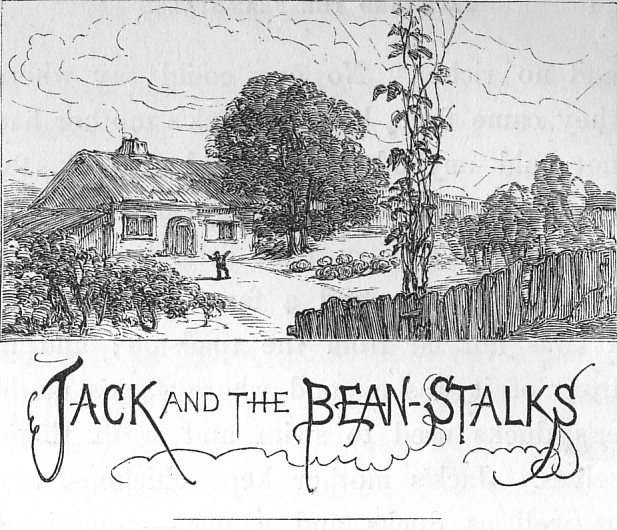
JACK was a good
boy, and very fond of his mother; but he did not know how to make
bargains. So what do you think he did when his mother sent him
to sell her cow?
But first I must tell you about Jack and his mother, who
they were, where they came from, where they lived, and what they did
for their living.
Well, Jack's mother was a very poor woman; and you may be
sure Jack was of the same family, and no richer. No one could
say where they came from, because Jack's mother had not told
anybody; neither had Jack, for Jack did not know. They lived
in the country, in a very neat little house, with a pretty garden
and a few trees about it. It was not far from the roadside;
and in front of it was a pond where Jack's mother's ducks used to
swim and wash themselves. Jack's mother kept chickens, too, as
well as ducks, and a pig, sometimes two pigs, and a red cow, and
a tortoiseshell cat. The ducks and chickens laid eggs; and the
red cow gave milk, of the cream of which Jack's mother made butter;
and the butter and eggs Jack took to market. They made bacon
of the pigs, and very good bacon it was. The tortoiseshell
cat, too, was good, though not exactly good to eat; but she caught
mice, and ate them. Jack was very fond of the tortoiseshell
cat; and puss was fond of him in her cat way, and liked to sit on
his knee or his shoulder, or to follow him about the garden when he
was at work in it. There was a little redbreast that also
followed him in the garden, and was on good terms with him and the
cat.
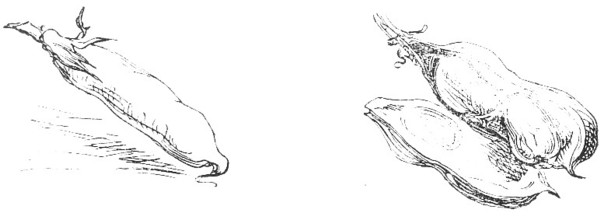
Jack was a capital gardener. He grew potatoes, red champions
and ladies' fingers and first and second earlies; and carrots,
fine, long, straight orange carrots; and cabbages, sometimes
purple cabbages for pickling, and broccoli; and spinach; and peas,
and beans, that is broad beans like these. But there was one
sort of beans called scarlet runners, which, he had been told, grew
up to a wonderful height, almost to the sky. These he had
not been able to get; and if there was one thing more than another
that Jack longed to see growing in his his garden (for he was very
proud of his garden both for its beauty and for its use to his
mother and himself) it was some of these giant scarlet runners.
And this reminds me that you are wanting to know what Jack did when
his mother sent him to sell her cow.
But why did his mother want to sell her? I will tell
you. Last year the potatoes were nearly all spoiled. So
Jack's mother was not able to keep a pig. So they had no
bacon. So they were obliged to eat their butter and eggs
instead of sending them to market. So they had no money to buy
clothes or to pay the rent of their house, for the cottage did not
belong to them. And so they had to sell the cow.
Then Jack's mother bade good-bye to the cow (for she was very
sorry to part from her); and as Jack was setting off his mother said
to him, "Now, Jack, dear! do think of what you are about, and do not
sell the cow unless you can get a good price for her."
Away went Jack with the cow to market, but before they could
reach there they met the butcher. "Good morning!" said Jack:
"Good morning!" said the butcher. "Where are you taking the
cow?" said he. "I am taking her to market, to sell her,"
answered Jack. "How's that?" said the butcher. So Jack
told him all I have told you,how they wanted money, and must sell
the cow, though they did not like to do so. "Well!" said the
butcher, "how much do you want for her?" "I don't know," said
Jack, "but my mother told me not to sell her unless I had a good
price for her." "Will this be enough?" said the butcher,
showing him a handful of money. Jack saw it was a great deal
more than he had ever had before; so he did not stop to count it,
but said directly, "I think it would." "You shall have it,"
said the butcher, "and you need not go any farther." "I should
like to go to the market, though," said Jack, "because I want to buy
some beans, some very beautiful beans, that grow up nearly to the
sky; and I think if my mother saw some of them growing in our garden
she would not be so sorry for losing our cow." "O, you mean
scarlet runners," said the butcher; and he pulled a few of them out
of his pocket. "O, how beautiful! said Jack; will you sell me
some? have you any more?" "No! these are all," said the
butcher; "but I'll sell you them; only they are very dear!"
"You shall have the cow for them instead of for your money; take the
money back, and give me the beans!" said Jack. So the butcher
took back his money, and gave Jack the beans, and wished him good
morning again, and walked away whistling and driving the cow before
him. And Jack ran home with the beans.
When he got home, his mother was gone to a neighbour's; so
away he went into the garden, and dug a piece of ground, and sowed
the beans. And as his mother was not coming home till late in
the evening, he went to bed, and left telling her about his great
bargain till next day.
In the morning he was up with the sun; and the first thing he
did was to run into the garden to look where he had sown his beans.
He did not expect to find them growing, but to his astonishment not
only were all above the ground, but some three or four of them had
twined round each other and grown up so high that Jack could not see
the tops, which indeed were quite hidden in the clouds. While
Jack stood wondering, and looking up at them, he fancied he saw a
bunch of scarlet blossoms a long way up. That was stranger
still, for the beans to grow up to the sky and blossom too, all in
one night. So he thought he would climb up the stalks, to get
the blossom to show to his mother. He put his foot on one of
the cross stems, and found it quite strong enough to bear him; and
up he went.
When he was nearly as high as the tops of the trees he missed
the blossom; but he saw some higher still, and so climbed up
farther. Then he lost that bunch, and climbed again toward another,
and so up, up, up, right through the clouds, climbing and climbing
till he was tired, and, looking down, could not see his mother's
house, nor the fields, nor the road, nor the tree-tops, nor even the
great mountains. There was nothing but cloud below him.
And then he looked up; and there was such a splendid bunch of
scarlet blossoms that he could not help going on again.
Just as he reached it (and he had to go into the cloud
to come at it), the wind blew away the cloud, and he found that the
bean-tops were hanging over a road-side; and in front of him, some
way along the road, was a very strange-looking house. He was
not sure, at first, but what it was the head of a giant looking at
him; and the windows looked like the giant's two eyes. Then
all at once he recollected how his mother had used to tell him about
a giant, and what he had done to her and to Jack's father,how they
had once been very rich, 'till the giant came and took away all they
had. Jack thought to himself, perhaps that is the giant, or
at all events, his house; it's quite big enough for a giant's home.
I'll go there and see if I can find anything belonging to my mother,
and make her rich again. So he stepped off the bean-stalks
into the road, and walked toward the giant's house. And then
he saw that the sun was very low, and the night coming on; for he
had been all the day climbing up the beanstalks without thinking of
the time, and now he was hungry.
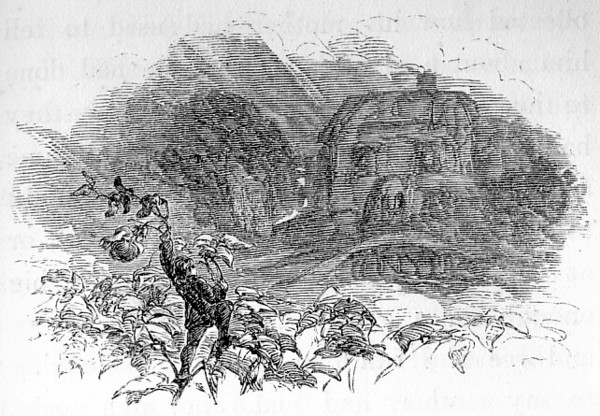
At last he reached the house. There was a little ugly
old woman at the door, and she asked him what he wanted. Jack
said he would be very glad of anything to eat. So the old
woman gave him some young bean-pods cut up small and boiled, which
he found were very good. Then she asked him if he wanted
anything else. "Yes!" said Jack, "I want to know if this house
belongs to the giant who robbed my mother."
"I know nothing about your mother," said the old woman; "but
this is the giant's house, and the giant is coming home directly;
you had better not say such things to him. There!" she went
on, "get away into that cupboard, for if the giant finds you here he
will beat us both. You wait there till he goes to sleep after
supper; and then, as soon as the Moon is up, you can run off and get
down the bean-stalks again."
Then she pushed him into the cupboard, and went to make the
supper ready. In came the giant, very tired, and very hungry,
and very ill-tempered. He was such a big fellow that his head
almost touched the ceiling. Down he sat in his chair, such a
bump that Jack thought the floor was breaking in. And then he
bawled out for his supper so loudly that Jack was obliged to put his
fingers in his ears. When he had eaten a very great supper, he
shouted out again for the old woman to bring him his two MONEY-BAGS.
The old woman brought them, and put them on the table before him.
And the giant emptied a great heap of bright gold coins out of one,
and a heap of silver coins out of the other, and counted them, and
laughed, and said very loudly to himself, "Jack's mother shall not
have these again!" And then he put all the coins into the bags
again, and tied up the bags and leaned back in his chair, and fell
asleep, and snored like thunder. Jack knew by what the giant
said that the money belonged to his mother; so as soon as the moon
shone through the window he slipped out of the cupboard, laid hold
of the bags, popped one under each arm, and ran out of the house
along the road to the beans, and down the bean-stalks as fast as he
could till he was at home again.
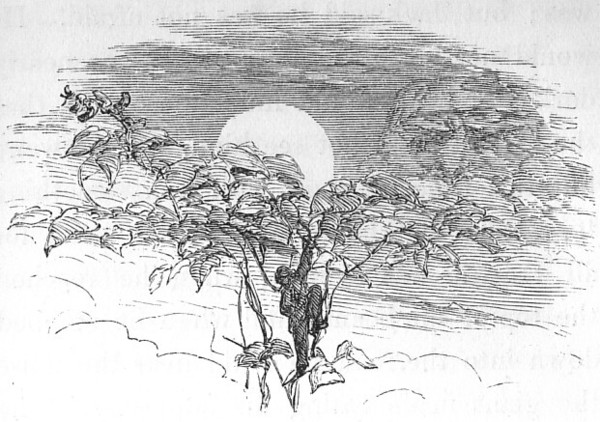
His mother was so glad to see him, and gave him his supper,
and got him to bed. It was very late next morning when he
awoke. But as soon as he had finished his breakfast he said,
"Mother! I shall go up the bean-stalks again." "What
for, dear?" said his mother. "To see what else of yours the
giant has," said Jack. Then his mother was frightened, for she
recollected what a terrible big strong fellow the giant was; but
Jack said he was not afraid. He would not go to the house till it
was nearly dark; and he would hide himself, so that the giant should
not see him. Off he went, but this time he took with him
something to eat, so that he got on faster. Still for all that
it was evening when he reached the top of the beans; and when he
stepped down into the road he could hear the noise the giant made
eating his supper. So he had to make haste.
As he came near to the house he heard the giant roar out to
the old woman to bring him his HEN THAT LAID THE
GOLDEN EGGS. Jack made more haste. Luckily, as it
was summertime, the giant's door was left open; and in slid Jack,
into the great dark hall, and peeped through the hinges of the
kitchen door, and saw the giant sitting at table, with a beautiful
little grey hen before him, and in his hand a golden egg which the
hen had just been laying. The giant sat looking at the hen;
and presently his great eyes began to wink, and then to shut, and
his head began to nod. So Jack knew there was no time to be
lost; and he stepped quietly into the room, and the hen flew down on
to his hand, and he took her under his arm, and, not caring for the
golden egg, ran off as fast as he could through the moonlight.
His mother was sitting up for him, and very much frightened
about him; but she was too glad to have him again, and the hen with
him, to scold him for being so long. But she begged him never
to go any more up the bean-stalks. Jack asked her if the giant
had anything else of hers; and, as she could not deny that he had,
Jack next morning started again. The beans were now all full
of blossoms, and as Jack went up his wonderful ladder the sun shone
so brightly on the scarlet flowers, he could not help stopping
sometimes to admire them, so that it was late again when he got to
the giant's road.
The sun was down, and all was hushed and quiet. As he
came near the house, he was surprised to hear some most gentle and
delicious music, the sweetest he had ever heard in his life.
He went on slowly, listening, walked through the moonlight into the
giant's house, and there, before the giant, stood a delicate-shaped
HARP, which had been playing the giant to
sleep. Now the music ceased; and the great giant began to
breathe heavily, with a sound like the rush of the tide on the
sea-shore.
Jack recollected the wonderful harp of which his mother had
talked to him when he was a very little child, telling him how it
played of itself, and better than any one could play it, and how
much more she cared for it than for the money-bags, or even the
beautiful hen that laid the golden eggs. So Jack took up the
harp. But, the moment he touched it, it began to play again,
such a merry tune that the giant opened his great heavy eyes and
stared sleepily at Jack.
Jack did not look twice at him, but ran off with the harp
faster than he had ever run before; down the bean-stalks, hardly
knowing or caring where he set his foot, as fast as he could
scramble down, the harp twanging merrily all the while, and Jack's
heart beating as fast as the music, till he was on the ground again.
He did not dare to look back till then. Then he did; and high
up in the clouds he saw one of the giant's feet, like a great black
cloud, coming down the bean-ladder. There was his father's axe
lying on the ground; so he set down the harp, snatched up the axe,
and began to chop away at the bean-stalks. They were very
thick and tough; and it was dark, for the clouds had come over the
moon; but he worked manfully on. At last he cut them through.
There was a tremendous crash, like a clap of thunder, as if the
giant had fallen; and Jack ran into the cottage with the harp.
All night long there was a terrible storm and uproar.
Sometimes, when the wind blew fiercely, he thought the giant was
shaking the house-walls. But at last he was so tired that he
fell asleep. When he awoke next morning the beans were all
blown away. He never saw or heard anything more of the giant.
But his mother had the money-bags and the hen with the golden eggs;
and so they were able to buy clothes and bacon, and another cow, and
whatever else they needed to make them comfortable. And Jack
kept the harp (his mother gave it to him), and had music for all the
rest of his life.

――――♦―――
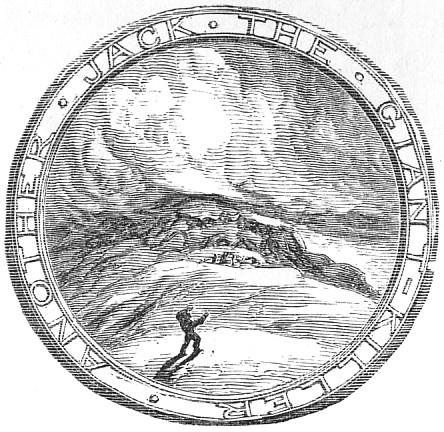
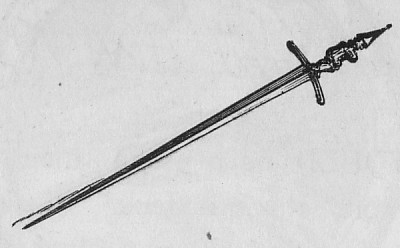
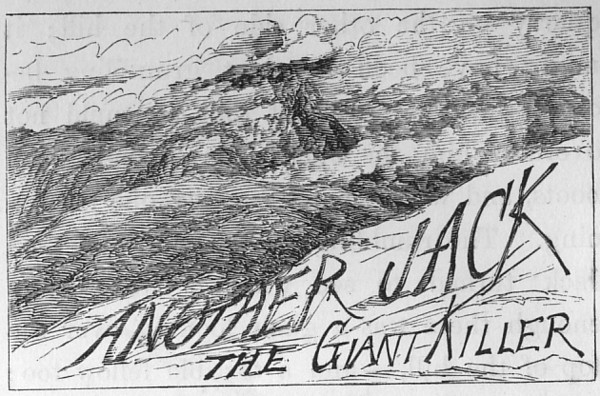
"'TWOULD be a
grand thing to kill a giant" thought Jack. It might have been
the same Jack who climbed up the bean-stalks, but I do not know.
"'Twould be a grand thing to kill a giant!" So, instead of
minding his work, he went to look for one.
Very hungry he was, and tired, before the day was out; but
not a giant came in his way. It was just in the dusk of the
evening when he heard a rumbling behind him. It might have
been from a stone quarry on the other side of the hill; it might
have been a giant grumbling because Jack went so fast that he could
not overtake him, for Jack wore seven-leagued boots, and was a match
for any one at running. The rumbling came again, and then Jack
turned to see what it was. Sure enough there was a giant
looking over the top of the hill, and a terrible fellow too; with
a head as big as a mountain-top, and lowering eyebrows for all the
world like bushes overhanging great clefts in a rock, so deep and
dark you could see no eyeballs in them. He seemed to be
smoking a pipe too (very likely, as it was evening), for a thin
cloud was curling up where his mouth should have been. Ay,
what a tremendous fellow the giant was! Half a mile high he
looked, at the very least. "O," cried Jack, "I wish I had my
sword of sharpness." "O, sword of sharpness," shouted the
giant back; not so loud, though, as Jack, but like his echo, "sword
of sharpness," as if he were mocking him. "O," cried Jack
again. And the giant did the same. Jack's courage was
gone; and he ran away home as fast as his seven-leagued boots would
carry him, never once looking to see if the giant's arm was
stretched forth to reach him.
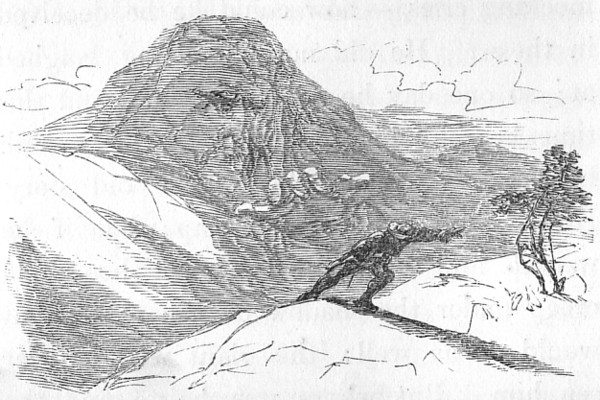
He minded his work for a day or two but he could not forget the
giant. "I never thought there were giants so big as that,"
said he to his playmates and school-fellows. No more did they;
and he was only laughed at when he talked of the Giant Half-a-mile
high.
Perhaps the laughing only made him more fixed in his opinion.
It was a giant. He saw him so plainly that he could not have
mistaken him for anything else; and then the smoke from his pipe,
and the mocking cries, how could he be deceived in these? He
did not like being laughed at; so one day he set off again.
And this time he took his sword of sharpness with him, like his
namesake in the old story. He had not an invisible cap; but if
he waited for the evening, when he could creep under the shadow of
the rocks, that would do as well: the giant would never see him.
But where was he to find the giant? He could not even be sure
of the exact place where he saw him; for at first he was not
thinking of anything, and afterwards he was too frightened to take
much notice. However, he had a half-holiday, wandered all the
afternoon, saw no giant; and when it grew dark was obliged to wait,
for he could not find his way home. So he plucked up as good a
heart as he could, though he was afraid to whistle for fear any
giant should hear him, and sat down, leaning against a large rock to
watch. No one came. Once or twice during the afternoon
he had thought he heard the giant growling; but it was a long way
off. Now all was quiet. After a while he ate his supper,
which be had been thoughtful enough to bring with him. Then he
walked about a little to prevent himself from falling asleep; then
he sat down to rest himself.
He had scarcely seated himself when he was sure he did hear
the rumbling, and, looking up, he saw not the giant's head, as
before, peeping over the hill, but the end of a foot, almost
directly over him, as if the giant was going to step from the crag
under which brave Jack was sitting. What a foot! almost as
large as a house. Jack was too frightened to draw his sword of
sharpness; but, instead, crouched close down under his bit of rock.
But if the giant's foot had come upon it, the rock and Jack and all
must have been crumbled to powder. Fortunately the giant did
not step directly down, but strode with one wide step right across
the valley, setting his foot at once upon the opposite hill; Jack
saw him pass over, two enormous legs; the body was high up in the
clouds.
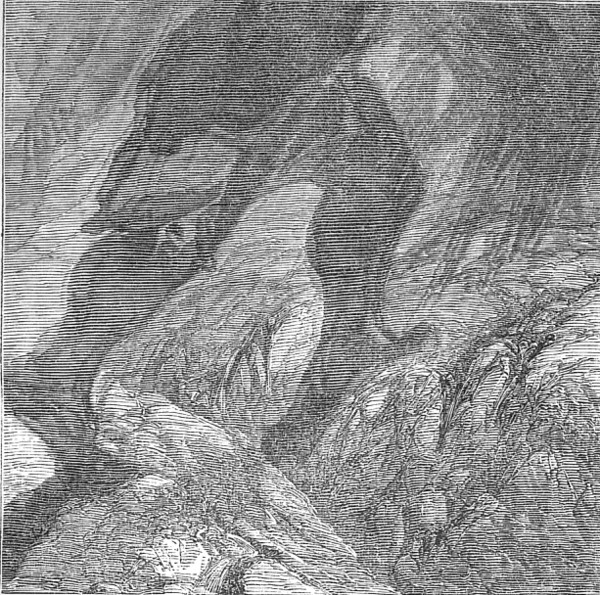
Whether Jack fainted with terror or fell asleep he never knew.
It was morning when he woke up, pale and faint, and his teeth
chattering. Little breakfast he was able to eat when he
reached home. And when he told his story (everybody knew he
would not say an untruth) all his companions, except some few who
thought he had been dreaming, gave over laughing at him, for a giant
as big as that, you know, was no joke at all. Suppose he came
one day and set his foot on the school when they were all in it, or
kicked over their fathers' houses. It was hardly safe to go to
sleep now.
Jack thought so too. But the first penny ever given to
him he had spent in buying the old story of "Jack the Giant-Killer"
(which, indeed, had first set him giant-hunting), and now, spite of
his fear, he could not help wondering whether the old Cornish giant
was as big as this one of his. If so, even yet he might be
killed. And then he would be Jack the Giant-Killer too,
Giant-Killer the Second!
So one day he again ventured out. He was, after all, a
brave fellow, and if he could but find the giant! Once more he
had a long day's wandering. At last he thought he found the
very hill over which he had first seen the giant's head. He
climbed boldly up the front, then crept on all-fours to the top and
lay down in the fern to look over. It was evening,
the shapes of the mountains were already growing indistinct;
but surely he could not mistake what lay beneath him, some little
way down the hill. It was a giant form, ay! of a man dressed all
in green, except that he had a purple sash round his waist and a
purple cap drawn down over his face. He lay on his back, with
his knees rather up, and his arms under his head. It was the
giant, and asleep.
Jack looked a long time intently on him; he did not move, nor
did he seem to have any weapon. He was certainly asleep then,
and unarmed. Jack drew his sword of sharpness. He
listened: there was no sound but what might have been either the ebb
and flow of the distant sea or the giant's heavy breathing. He
crept slowly down through the fern to the giant's side.
Evening was darkening round him, and in a little while he would not
see even the giant,what if he should fall up against him and
disturb him; the giant roll upon him, or snatch him up? He
kept his eyes fixed on the purple sash of the giant, that he might
guess where the great fellow's heart was. It would never do to
miss his blow.
At last, stepping noiselessly over the turf, he was at the
giant's side, and thrust his sword of sharpness up to the very hilt
into him, with such force that he could not draw it back again.
The giant never moved nor groaned. The one blow was enough.
Brave Jack!
But now it was quite dark, and Jack did not like the thought
of staying there with the dead giant. So, leaving the sword in
him, he returned home.
Early next morning he summoned his friends to come with him
to the scene of triumph, some few of them to be favoured by first
witnessing the monster. Then Jack would draw out his sword,
and they should rouse the whole village to carry the body off.
Would it not be a glorious day?
They reached the hill-top whence Jack had first espied him.
They all stopped: he pointed down. Why, Jack! your giant is
only a part of the hill, and the cap and sash are great patches of
the purple heath!
Jack never went giant-killing again; he thought it a waste of
time.
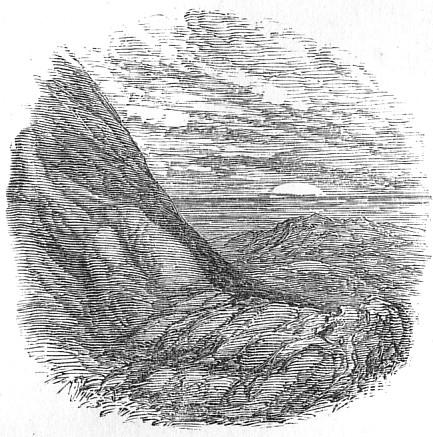
――――♦――――
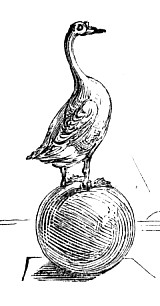
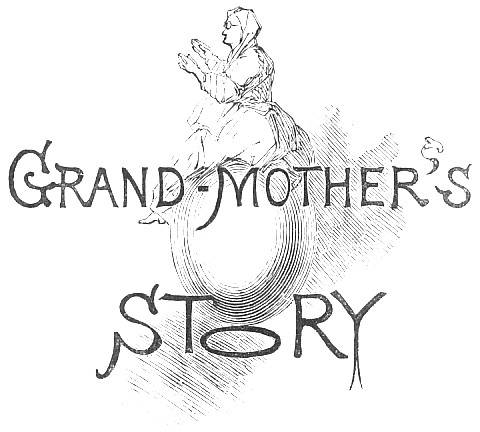
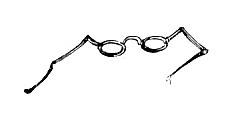
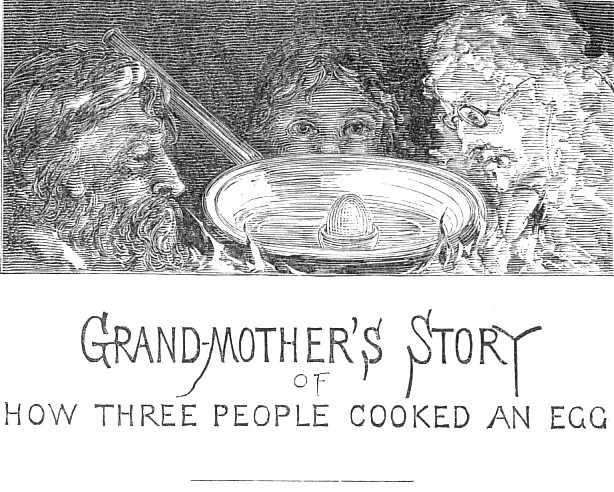
THE three people
were an old woman, a man, and a little girl.
The old woman had an egg for supper; and when she had broken
off the top she found it was not done enough. How was that to
be mended? The little girl brought a sauce-pan, but the
trouble was to put the egg into it. They made a noose in a
piece of string, put it round the egg-cup, and let the egg-cup, egg
and all, down into the saucepan, and then set the saucepan on the
fire.
After a little while they took it off, to see if the egg was
done. Not a bit, and all, no doubt, because they had
forgotten to put the egg's end on. So they set the end on, and
the saucepan on the fire, and presently looked again. But the
water had all boiled away, so the little girl had to go for more.
She was a very clever child, and brought hot water and did not the
egg wabble about in it, and make them all three quite nervous for
fear the egg-cup should be overset and the yolk run out!
After half an hour or so they thought it must be done.
But the difficulty was how to get at the egg for eating. The
old woman said she would pick it out; but they told her she would
scald her fingers, and perhaps spoil her gown. The man said,
"Set it down outside the door to cool!" but then the dog might run
away with it. The little girl talked of boring a hole in the
saucepan, and so draining off the hot water. She was a very
clever child, but they had nothing to bore the hole with.
At last the man held the saucepan over the hearth-rug, and
the old woman and the little girl took each a spoon and lifted the
egg safely out of the egg-cup into the old woman's lap. And
the old woman made an excellent supper, for all the egg was rather
watery, which she said made it more like a duck's egg; and there was
prime egg-broth left in the saucepan for the cat.
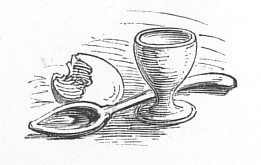
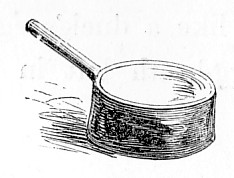
――――♦――――
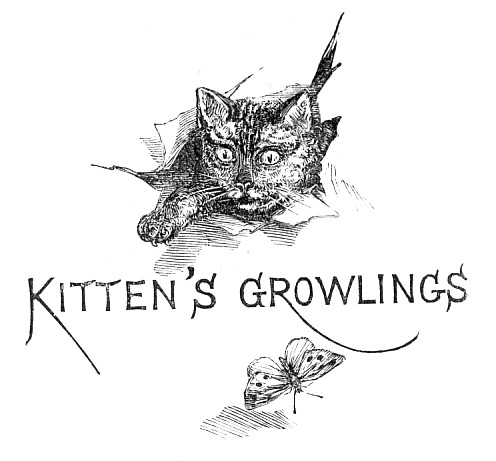
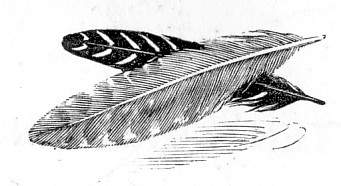
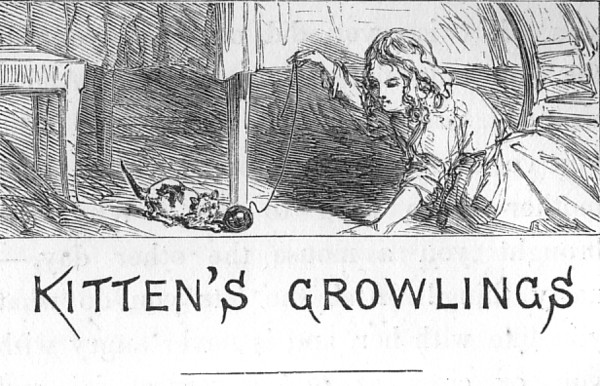
"O, HOW nice it
would be to be a kitten! Just think, Maggie! No lessons,
no sewing, no scolding, no chilblains. Nothing to do but to
lie cozily on the hearth-rug before the fire, and be petted, and
play with her tail. Don't I wish I was a kitten!"
"I wish I was anything else," said the kitten, looking up in
the little girl's face.
"Just listen, Maggie! to the foolish thing! Why, you
naughty, wicked, ungrateful, silly little puss! Here I've been
nursing you in my lap nearly all the day; and if I did let you fall
twice, you did not hurt yourself, for you only fell on the carpet.
And I wrapped you up in my best frock. And you've nice milk
and bread. And your mother is so kind to you. Why, she
brought you a mouse the other day, nasty thing! And she lets
you do what you like with her, and is never angry with you, or cross
as our governess is; and you've no clothes to mend, because you
can't tear your clothes; and no spelling; and you're not washed of a
morning in cold water; and "
"All very well, Miss Nellie! but you're not a kitten, or
you'd not like it so much. I don't care if I do get mice.
I want birds. I want all the birds I see. I want to eat
your canary."
"O you wicked, wicked kitten!"
"And I want to eat it with the feathers on."
"You silly thing!"
"And the feathers choke me. I want all the birds and
all the butterflies. They are such pretty things; and I've
never tasted one yet. When mother brought me a nice young
thrush she would not let me eat the feathers. And they were
such pretty feathers, and I wanted to eat them. And the
squirrel's tail choked me. And I can't get the birds in the
trees, nor even the great sleepy moths. And the little black
houseflies, when I can catch them, are nasty; and I don't like them
when I eat them. And then mother scolds me for it, and says
they make me thin. But she eats them herself. And I
heard your papa say she eats black beetles too. What are black
beetles? Are they nice? O, I don't care about thrushes
and mice; I should like to have black beetles. I want black
beetles. I am sure there are some up high in the kitchen
cupboard, if mother would let me have them. But she keeps them
all for herself."
"But they do make mother thin, kitten dear! and you ought not
to eat them."
"But I want to. And then they'll not let me get under
the grate, and they knock my nose against the bars if I do. I
like getting under the grate; and I'd like the red coals to fall on
me, that I might play with them. Red coals are prettier than
butterflies. Nasty butterflies! they never come near enough to
be caught. I was turned out of the fender twenty times
yesterday. And I must not run up stairs into the bed-rooms,
nor sleep on the beds. And they whip me off the stairs, and
off the chairs in the drawing-room, and won't let me climb up the
curtains. And I must not go on the table, nor put my tongue in
the cream-jar, nor lick the bread and butter. Fresh butter is
so nice. I mustn't do anything. I get on the newspaper
in your papa's easy chair, sometimes; and it crackles; and it's such
fun. And then I'm knocked off. You hished me off one
day, Miss Nellie! for all you sit there when nobody's in the room.
"What's the good of nibbling your pa's waistcoat-buttons,
when I can't even get a taste out of them? Why can't I eat
them? What are they made of? Horn! Why don't they
make buttons of butter? I should like then to climb up
your pa's waistcoat. It's only a little fun now. And
mother's jealous of me. She wants to sit there instead of me.
"I do get under the grate sometimes, though, and stay there a
good while, when cook's not in the kitchen. O, don't I run
when she comes in! But then what a trouble I have to clean
myself. And when I don't mother will; and that's worse: she
cleans me so hard, and licks me so much, four or five times over.
And she don't play fair with me. She 's a deal stronger and
bigger than me; and when I want to throw her down I can't, and it's
not fair.
"Yes! I like running after your ball. But I get tired.
And I like running after your sister's ball of worsted; but she
takes it away from me, and won't let me play with the
darning-needle."
"Why, you foolish kitten! you'd prick your nose, and perhaps
put your dear little eyes out; and you'd get the worsted all in a
tangle, and then we couldn't mend papa's stockings, and he'd have
such big holes in them, and get chilblains, perhaps, as I do.
You never had any chilblains, and you're a deal better off than I
am."
"I don't care. I like to get the worsted in a tangle.
I like to prick my nose. Needles don't prick. And I
don't know what chilblains are, and don't care for them. Are
they like black beetles? But I don't care."
"O Maggie! what a stupid kitten! She thinks chilblains
are like black beetles. No, pussy! they are "
"I don't care what they are. I haven't to learn
lessons: that's something."
"Yes! it is, pussy!"
"O, but I want to catch my tail. There, I've run round
twenty times, fifty times, and it's as far off as ever. And
I run up and down the room and through all the passages, and I never
can catch that grey kitten on the wall, that mocks me and makes fun
of me."
"Kitty! that 's your shadow. Didn't you see it get on
its hind legs, or creep along the ground, or jump away, or do just
what you do?"
"What's a shadow? You think it very pretty, don't you,
miss, to see me on my hind legs? I want to walk on them like
you. But I can't keep up. I want to run up all the trees
and catch all the birds, and up the sides of the house, and all over
the top, and look down the chimney, all the chimnies.
Wouldn't I like to come down a chimney and plump into the frying-pan
on the top of the pancakes, and frighten that old ill-tempered cook.
I can't, do anything I want to do."
"Upon my word, Miss Puss! you are a pretty kitten to be so
unreasonable."
"I know I am a pretty kitten. I dare say I shall grow
up to be a handsome cat. Mother purrs over me when she is in a
good humour, and says so. But I want a black bar across my
nose, and four white feet, and I want "
"You're a foolish, dissatisfied little thing; and if I was a
kitten a tortoise-shell kitten like you I wouldn't grumble.
Would you, Maggie?" |